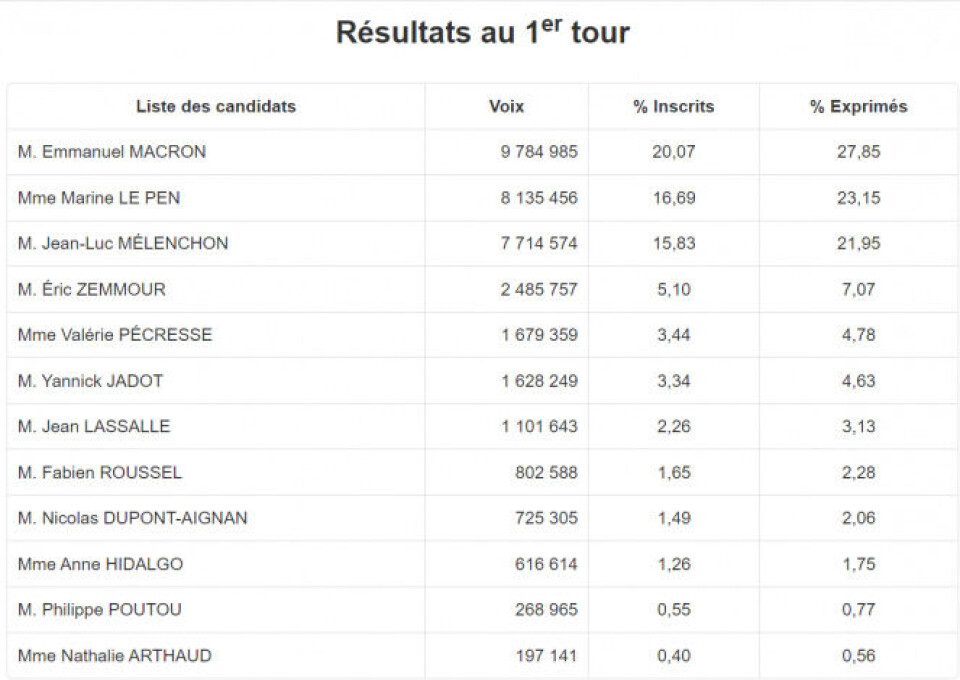-
Hosting scheme in south-west France lets newcomers sample lifestyle
Households in nine Dordogne communes volunteer under Mes Nouveaux Voisins scheme
-
French boulangeries demand right for staff to work on May 1 so they can open
Artisan bakery owners can work but employees cannot, while certain industrial bakeries are allowed to remain open with workers
-
How many Americans live in Paris - and where else are they choosing in France?
Over a quarter of all US nationals in France live in the capital city
French election: The chase is on for Mélenchon’s 7.7 million voters
The supporters of the left-wing candidate are now coveted by both Macron and Le Pen ahead of the second round. A poll shows 23% plan to vote Le Pen

The supporters of left-wing Jean-Luc Mélenchon, who finished third in the first-round of the presidential election on April 10 with nearly eight million votes, will play a crucial role in deciding who wins in the second round on April 24.
Emmanuel Macron (La République En Marche) and Marine Le Pen (Rassemblement National) finished as the top two candidates last Sunday (April 10), winning 27.85% and 23.15% of votes respectively.
This equates to 9,784,985 votes for Mr Macron and 8,135,456 for Ms Le Pen.
Mr Mélenchon (La France insoumise) finished just behind Ms Le Pen with 7,714,574 votes.
And these almost eight million votes are highly coveted by Mr Macron and Le Pen as the pair relaunch their campaigns ahead of the April 24 vote.

Credit: Governement
Read more: What happens now in the French election, will there be a TV debate?
Who will Mélenchon’s voters support?
Mr Mélenchon was very explicit when on first-round election night he repeated four times: “Do not give a single vote to Madame Le Pen!”.
He did not, though, advocate voting for Mr Macron.
Read more: Sport stars in France urge voters to stop Marine Le Pen winning
Despite his words, a poll commissioned by TF1 and published on April 10 shows that 23% of Mr Mélenchon’s voters plan to back Ms Le Pen in the second round.
It shows that 33% plan to vote for Macron, while 44% intend to spoil their vote or not vote at all.
Our graph below shows how supporters of the candidates who did not qualify for the second round intend to vote in the second round. Data was not available for all 10 candidates.
Scroll your mouse over the different lines in the chart to see the breakdown more clearly.
The figures used are based on early election results from April 10 when the majority of votes were counted, but not all.
Several Mélenchon activists told The Connexion that they either plan to spoil their vote, abstain or could potentially vote for Mr Macron. They said that none of them knew of any Mélenchon supporters planning to vote for Ms Le Pen.
How is Le Pen trying to woo Mélenchon’s voters?
Ms Le Pen criticised Mr Mélenchon for not backing her, calling it “treason” and saying that by letting his voters believe that Mr Macron must be re-elected, “he has removed all of their ability to be protected”.
Her plan is to put forward her policies that are most similar to left-wing ideas, such as supporting citizen referendums or full proportional representation at the legislative elections.
She is also focusing on themes that left-leaning voters tend to gravitate towards, such as spending power, protection for teachers and democracy.
Ms Le Pen told a Mélenchon voter who phoned in during a radio interview with France Inter that she is “probably the [candidate] who most respects democracy and is the most attentive to individual freedoms”.
"I want to focus on making life easier for the most vulnerable."
Ms Le Pen has generally captured the working-class vote, far more so than Mr Macron.
An Ipsos survey published on election night (April 10) showed that Ms Le Pen won 36% of blue-collar worker votes, compared to 17% for Mr Macron.
On the contrary, 35% of high-earners (CEO, managers, etc) voted for Macron, compared to just 12% for Le Pen.
Ms Le Pen is banking on this element to win left-wing votes.
She has talked about lowering or scrapping VAT on food and energy products to improve households’ purchasing power.
In general, her election campaign has focused much more on household finances than on her more controversial policies on immigration and Islam.
The vice-president of Rassemblement National, Louis Aliot, put it more bluntly in an interview with BFMTV.
“Unless these people are suicidal, I don't see why they would go en masse to vote for Mr Macron.”
Read more: French inheritance tax: How Macron and Le Pen plan changes
How is Macron trying to woo Mélenchon’s voters?
Mr Macron is seen by many as the candidate of the rich. He is also strongly supported by pensioners, winning around 38% of their votes in the first round.
Read more: ‘Election has become a question of everyday people versus elites’
In 2017, Mr Macron campaigned as a candidate of neither the Left or Right. However, he is seen as having moved right of centre during his time in power.
Many Mélenchon supporters will be put off backing him while he has Gérald Darmanin serving as his Minister of Interior. Mr Darmanin is seen as more hardline in terms of immigration and migrant rights.
Marlène Schiappa, Mr Macron’s Minister for Citizenship, models herself as left-wing. She said on Sunday evening following the publication of the first round results that “a new challenge will begin”.
“It will be up to us to go and convince those who voted for other candidates, in particular Jean-Luc Mélenchon, to back us,” she told France 2.
She emphasised social measures taken during Mr Macron’s time in power, such as the automatic payment of social aid benefits to those who qualify, or the adjustment of pension rates to match inflation.
She also spoke of women's rights, human rights and rights for asylum seekers, values she says supporters of both Mr Macron and Mr Mélenchon have in common.
Mr Macron has also shown flexibility since Sunday’s results. He said he is willing to “move” on his plan to increase the pension age from 62 to 65, a policy widely criticised by those on the Left, including Mélenchon supporters.
“I am prepared to adjust and say that we do not necessarily need to carry out a pension reform until 2030 if I feel that people are too anxious. The age of 65 is not set in stone,” he told BFMTV.
As for Ms Le Pen, she has said she will not change the retirement age from 62.
Related articles
Macron - Le Pen: What do they each pledge to change if elected?
Formal complaint against far-right Zemmour over text to Jews in France
Explainer: what is the role of a French president?
























